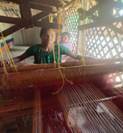
In a powerful initiative aimed at promoting tribal artisans and their remarkable artistry, Tribal Cooperative Marketing Development Federation of India Ltd.(TRIFED) has collaborated with Ministry of Ayush to supply 34,000 yoga mats.
This collaborative effort, set to coincide with the upcoming International Yoga Day, highlights the government’s commitment to uplift tribal communities and celebrate India’s rich cultural heritage. This initiative not only bolsters the economic prospects of tribal communities but also ensures the preservation and promotion of their unique artistic traditions.
The 34,000 yoga mats, procured exclusively from tribal artisans across different regions of the country, will bear the distinct designs and motifs representative of their respective communities. Each mat is a vibrant testament to the diverse cultural heritage of India’s tribes, reflecting their stories, folklore, and artistic legacy.
The yoga mats procured by TRIFED from the tribal artisans will be utilized by the Ministry of Ayush on International Yoga Day for various events, workshops, and training programs that are organized. The mats will act as catalysts, fostering a deep connection between yoga enthusiasts and the rich cultural heritage of tribal artisans. Through these interactions, participants will develop an appreciation for the artistic brilliance and cultural depth that tribal communities bring to the country’s diverse tapestry.
As International Yoga Day approaches, TRIFED and the Ministry of Ayush’s joint efforts will serve as a beacon of inspiration, celebrating the artistic legacy of tribal communities and fostering their socio-economic empowerment. Together, they demonstrate the transformative power of collaboration, promoting cultural diversity, and nurturing the invaluable contributions of tribal artisans to India’s rich cultural heritage.
As a part of this joint effort, TRIFED will highlight the following products/communities-
Discovering the Artistry of Santhal Community: Unveiling the Spirit of Madurkathi Mats from Medinipur
Embracing the authentic craftsmanship of the Santhal community TRIFED will present the essence of Madurkathi, an integral part of Medinipur’s rich weaving heritage. Carefully handcrafted by skilled tribals, these mats encapsulate the cultural legacy of West Bengal.
Similar to the intricate craftsmanship involved in weaving a saree using a Fly Shuttle Handloom, these mats intricately intertwine cotton yarn as the tana (vertical threads) and Madurkathi as the bona (horizontal threads).
More than just mats, these creations offer a range of benefits. Their non-conductive nature and exceptional sweat-absorbing properties make them indispensable in West Bengal’s hot and humid climate. Additionally, they hold great significance in religious rituals and practices.
Ms. Sonali Sinku, Ms. Ratri Tudu, Ms. Nilima Murmu and Ms. Pranati Tudu are a few tribal weavers involved in the production of mats. These talented tribal weavers contribute their skills and craftsmanship in the production of mats from various districts, including Beltala, Gochara, Sanchara, Kangal Beria, Debra, and Laulara in Medinipur and Purulia districts.
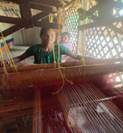
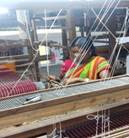
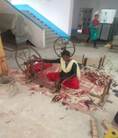
Ms. Ganga Murmu Ms. Archita Soren Ms. Astami Tudu


Ms. Basanti Hemran Ms. Jabarani Tudu


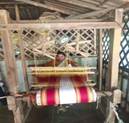
Ms. Mausumi Tudu Ms. Pranati Murmu Ms. Purnima Tudu
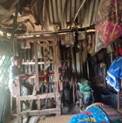
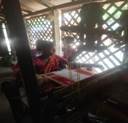
Ms. Ratri Tudu Ms. Sandhya Murmu
Unveiling the Tranquility of Nature with Exquisite Sabai Grass Yoga Mats from Mayurbhanj, Odisha
Found and birthed amidst the tranquil beauty of Simplipal Reserve are the Sabai Grass Yoga Mats. Crafted with natural materials, these mats are a testament to the inherent connection between the Tribals of Mayurbhanj, Odisha, and the lush landscapes that surround them.
The process of weaving Sabai grass mats involves harvesting and sorting the grass, followed by drying and treating it for pliability. Using a loom with vertical warp threads, the weaver interlaces Sabai grass weft threads horizontally through them, employing twining techniques for durability. Additional colors and patterns may be introduced with dyed grass. Maintaining consistent tension, the weaver completes the weave, trims excess grass, and secures loose ends. The finished mat undergoes quality inspection and optional treatments for enhanced durability and appearance. This skillful process yields beautifully crafted, sustainable mats that combine aesthetics with longevity.
Known for its lightweight and pliability, is expertly transformed into exquisite products such as mats, baskets, cots, furniture, wall hangings, decorative boxes, and coasters. The unique composition of these mats, predominantly comprising cotton and Sabai grass, offers exceptional absorbency and comfort, making them a sustainable and essential companion for yoga enthusiasts and practitioners alike.
By incorporating natural materials and the artistic traditions of the Santhal community, these mats provide individuals with a serene and eco-friendly yoga experience.
Smt. Usharani Naik, a member of the Bathudi tribe from the village of Gohaldihi in Mayurbhanj, Odisha, contributes her skills to the creation of yoga mats.Smt. Gurucharan Naik, a member of the Bathudi tribe from the village of Betnoti, Mayurbhanj, Odisha, is another skilled artisan contributing to the production of yoga mats. These artisans from various tribes in Odisha bring their expertise and cultural heritage to the creation of high-quality yoga mats.
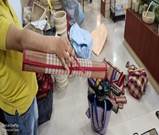


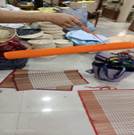

Reviving Tradition and Empowering Communities: Gondha Grass, a Remarkable Community-Based Enterprise
Nestled in the heart of Potka block in East Singhbhum, Jharkhand lies a community-driven enterprise that celebrates the beauty and potential of Gondha Grass. Harvested from waste land and riverbeds by tribal women, Gondha Grass represents the rich heritage and sustainable practices of the local communities.
Gondha Grass, collected from waste land and riverbeds, is dried, sized, and processed into fibers. The weaving process involves plantation, cutting, splitting, and sizing of the grass. Cotton yarn and Gondha Grass are used to create various craft items such as mats, bags, covers, and domestic items. Yarn is wound on bobbins, threaded through healds and reeds, and wound on the warping beam. The weaving process interlaces the warp and weft threads, creating intricate patterns.
The grass mats are known for their durability, versatility, and eco-friendly nature. By preserving traditional weaving techniques and utilizing natural materials, the enterprise not only offers unique and high-quality products but also empowers local communities to thrive.
The Gondha Grass enterprise stands as a testament to the power of community, tradition, and sustainable entrepreneurship. By preserving traditional craftsmanship and empowering local artisans, it paves the way for a brighter and more inclusive future.



Saroj Hansda Karmi Murmu
Sarjamda Lupung Tola Sarjamda, Motka Tola,
Parsudih

Sarla Sardar
Janumdih Potka Block



Kamla Sardar Ashrita Sardar,
Janumdih, Potka block Janumdih, Potka block

Sumitra Sardar
Janumdih Potka Block







Leave a Reply
You must be logged in to post a comment.